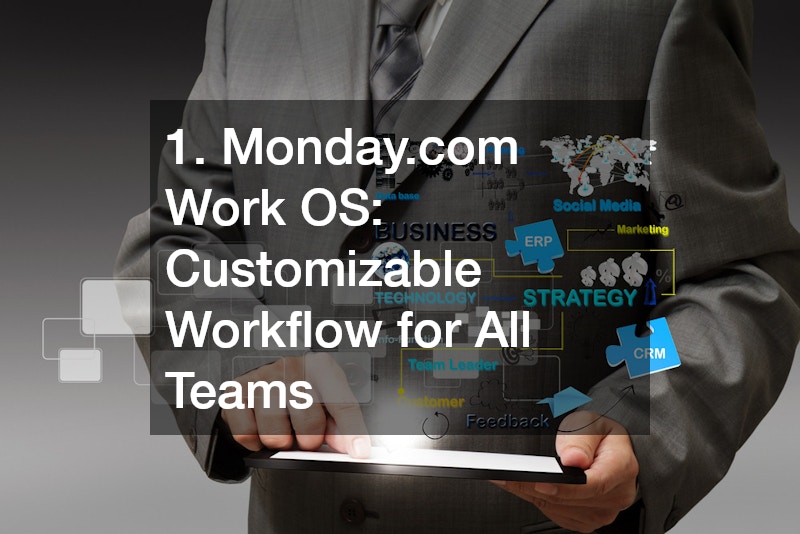
As businesses continue to embrace automation, data centralization, and process optimization, the demand for powerful enterprise workflow management tools has never been higher. In 2025, top-performing organizations are streamlining operations by investing in platforms that offer greater visibility, collaboration, and integration across departments. Business owners and executives who want to improve efficiency, reduce operational costs, and foster scalable growth must pay close attention to the tools shaping the enterprise workflow landscape this year.
In this article, we’ll explore the top 7 enterprise workflow management tools that are transforming the way businesses operate. Whether you’re upgrading from manual processes or replacing outdated systems, these tools offer advanced capabilities to support modern, agile workflows.
What Makes a Great Workflow Management Tool in 2025?
Before diving into the list, it’s important to understand what sets high-performing workflow platforms apart. In today’s enterprise environment, a workflow tool must do more than just route tasks. It should:
- Automate repetitive and time-consuming processes
- Offer real-time data and reporting dashboards
- Integrate with other enterprise systems (ERP, CRM, HRM, etc.)
- Support multi-departmental workflows
- Provide scalability for growing teams
- Offer customization based on industry-specific needs
For business owners and executives, the right platform can lead to measurable productivity gains, more accurate compliance, and improved team collaboration.
1. Monday.com Work OS: Customizable Workflow for All Teams

Monday.com continues to evolve from a project management app into a full-fledged enterprise workflow solution. Its flexibility makes it ideal for both structured business processes and creative team workflows.
Key Features:
- Drag-and-drop automation builder
- Integration with over 200 tools (Slack, Salesforce, Microsoft Teams)
- Real-time dashboards and workload tracking
- Industry-specific templates (marketing, HR, operations)
Best For: Mid to large-sized businesses that need customizable workflows without heavy coding requirements.
2. Kissflow: Simplified Enterprise Workflow Automation
Kissflow is purpose-built for enterprise workflow management, making it a top choice for organizations seeking no-code automation across multiple departments.
Key Features:
- Visual workflow designer
- AI-powered task assignment
- Powerful integrations with ERP systems
- Role-based access control and compliance tools
Best For: Companies looking to digitize and automate business workflow processes quickly.
3. Nintex: Advanced Workflow Automation for Complex Operations
Nintex specializes in complex, large-scale workflow automation. It’s ideal for enterprises with intricate compliance, approval, and document management needs.
Key Features:
- Visual drag-and-drop automation
- Robotic Process Automation (RPA)
- E-signature and document generation
- Advanced analytics and process mapping
Best For: Enterprises in highly regulated industries like finance, healthcare, and legal.
4. Microsoft Power Automate: Seamless Microsoft Ecosystem Integration
For businesses already invested in Microsoft 365, Power Automate (formerly Microsoft Flow) provides seamless automation with native integration into Outlook, Teams, SharePoint, and more.
Key Features:
- Prebuilt templates for faster deployment
- AI-based process suggestions
- Low-code app development via Power Platform
- Easy integration with third-party apps and services
Best For: Microsoft-centric enterprises seeking to enhance their existing tech stack.
5. Asana Enterprise: Scalable Workflow with Project Management Strengths
While Asana is widely known as a project management tool, its enterprise version adds robust workflow automation and cross-functional visibility.
Key Features:
- Workflow builder with rules-based automation
- Advanced admin controls and security settings
- Timeline, Gantt, and calendar views
- App integrations with over 200 platforms
Best For: Teams looking for a blend of project tracking and enterprise workflow features.
6. Smartsheet: Spreadsheet-Style Workflow Management at Scale
Smartsheet offers a unique spreadsheet interface that’s both familiar and powerful, making it ideal for executives who want detailed control over workflow processes.
Key Features:
- Customizable dashboards
- Workflow automation with conditional logic
- Collaboration tools like comments and notifications
- Enterprise-grade security and compliance
Best For: Operations-heavy businesses that rely on granular task tracking and resource allocation.
7. Trello Enterprise: Simple Visual Workflows with Strong Team Adoption

Trello may be simple on the surface, but the Enterprise version offers robust features that cater to large teams managing visual workflows.
Key Features:
- Kanban-style boards with automation rules
- Enterprise templates for recurring processes
- Integration with Atlassian tools (Jira, Confluence)
- Centralized admin and security controls
Best For: Enterprises prioritizing simplicity, visual organization, and quick onboarding.
Enterprise Workflow Tool Comparison: Features, Pros, and Ideal Use Cases
With so many workflow tools on the market, choosing the right one comes down to understanding the features, integrations, and strengths of each platform. Here’s how the top enterprise tools stack up:
| Tool | Key Features | Ideal For | Strengths |
|---|---|---|---|
| Monday.com | Drag-and-drop automation, 200+ integrations, dashboards, templates | Mid to large businesses | Highly customizable workflows across departments |
| Trello Enterprise | Kanban boards, Atlassian integrations, automation rules | Teams seeking visual simplicity | Easy onboarding, intuitive interface |
| Smartsheet | Spreadsheet-style workflow, conditional logic, dashboards | Operations-heavy enterprises | Detailed task tracking, resource management |
| Kissflow | Visual workflow designer, AI-powered task assignment | Companies wanting quick no-code automation | Fast digitization of processes |
| Nintex | RPA, e-signatures, advanced analytics | Complex enterprises | Compliance-heavy industries, large-scale automation |
| Microsoft Power Automate | Native Microsoft 365 integration, low-code apps | Microsoft-centric businesses | Seamless integration with Teams, Outlook, SharePoint |
| Asana Enterprise | Rules-based workflow builder, timeline and calendar views | Teams blending project management with workflow | Scalable project tracking with automation |
Which Enterprise Workflow Management Tool Is Right for You?
Selecting the right workflow management platform isn’t just about picking the most popular tool—it’s about finding one that fits your team’s size, complexity, and operational needs. Here’s how to approach the decision:
1. Consider Your Team’s Workflow Style
Different teams work in different ways. For example, some prefer highly visual tools that are easy to onboard, while others need complex automation across departments. Teams often weigh Monday vs Trello to decide between customizable dashboards and intuitive visual boards.
2. Assess Automation Needs
Ask yourself how much repetitive work you want the platform to handle. Do you need conditional workflows, approvals, or notifications? If you want a blend of flexible dashboards and spreadsheet-style control, a Monday.com vs Smartsheet comparison can help you see which tool matches your workflow complexity.
3. Evaluate Integration Capabilities
A workflow tool should integrate smoothly with your existing tech stack. Microsoft Power Automate works well if your business relies on Microsoft 365, while Kissflow or Nintex may be better for enterprises with diverse systems.
4. Check Scalability and Flexibility
Your workflow tool should grow as your business grows. Monday.com offers high customization across departments, while Smartsheet provides detailed tracking for operations-heavy teams. Trello Enterprise is great for teams that need simplicity and visual clarity without a steep learning curve.
5. Consider Security and Compliance Requirements
For highly regulated industries, features like role-based access, audit trails, and compliance tracking are essential. Nintex, for example, is often chosen by finance and healthcare teams for this reason.
Final Thoughts
In an era of rapid business transformation, having the right enterprise workflow management tool is no longer optional—it’s essential. The platforms listed above offer a variety of features tailored for different business models and goals. Whether you’re just beginning to automate or looking to scale enterprise operations, investing in the right workflow system will unlock new levels of efficiency and collaboration.


